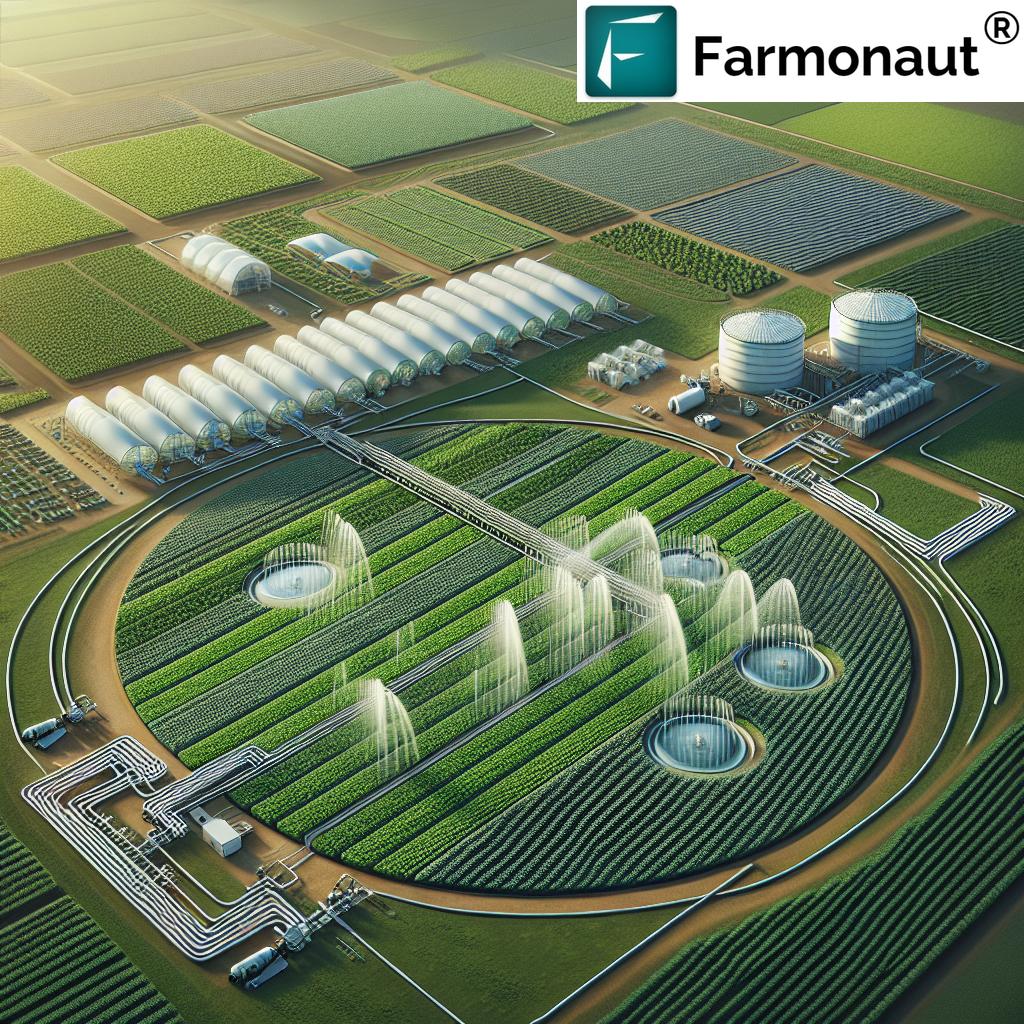Revolutionizing Washington’s Farms: How Clean Hydrogen and Smart Agriculture Are Powering Sustainable Crop Yields
“Recent government initiatives have allocated billions in tax credits to boost the hydrogen industry for agricultural emissions reduction.”
Welcome to Farmonaut’s latest exploration into the cutting-edge world of sustainable agriculture and clean energy. Today, we’re diving deep into how clean hydrogen production and smart farming technologies are transforming the agricultural landscape in Washington State and beyond. As pioneers in satellite-based farm management solutions, we at Farmonaut are excited to share insights on these groundbreaking developments that promise to revolutionize farming practices and contribute significantly to our fight against climate change.
The Dawn of Clean Hydrogen in Agriculture
The Biden administration has recently unveiled a game-changing plan that allocates billions in tax credits to support the development of clean hydrogen production. This monumental initiative aims to foster a robust hydrogen industry as a crucial component in the broader strategy to combat climate change. But what does this mean for agriculture, particularly in states like Washington?
Hydrogen, when used as a fuel, primarily emits water vapor, positioning it as a potential sustainable alternative to fossil fuels in various applications. In the context of agriculture, this clean energy source could transform everything from powering farm equipment to revolutionizing fertilizer production.

The Environmental Impact of Hydrogen Production
The environmental benefits of hydrogen hinge critically on its production method. Currently, most hydrogen is derived from natural gas through processes that release significant amounts of carbon dioxide. However, the push for “clean hydrogen” aims to change this paradigm by utilizing renewable energy sources like wind and solar power for hydrogen production.
This shift towards clean hydrogen production aligns perfectly with Farmonaut’s mission of promoting sustainable agriculture. Our satellite-based crop health monitoring system can play a crucial role in optimizing the placement and efficiency of renewable energy sources used in hydrogen production on farmlands.
Tax Credits: Catalyzing the Clean Hydrogen Revolution
In 2022, Congress approved a substantial tax credit aimed at incentivizing clean hydrogen production. These credits, potentially worth up to $3 per kilogram of hydrogen produced, could significantly offset the costs associated with transitioning to cleaner production methods. For farmers and agricultural businesses in Washington, this presents an unprecedented opportunity to invest in sustainable practices while potentially reducing operational costs.
At Farmonaut, we understand the importance of balancing economic viability with environmental sustainability. Our precision agriculture systems are designed to help farmers make data-driven decisions that optimize resource use and improve crop yields, complementing the benefits of clean hydrogen adoption.
Navigating the New Guidelines
The recently released final guidelines for clean hydrogen tax credits strike a balance between incentivizing production and ensuring environmental protections. Key points include:
- An extension until 2030 for producers to meet hourly clean electricity sourcing requirements
- Easier qualification for credits in states with stringent low-carbon electricity mandates, like Washington
- Allowances for using methane from landfills or farms to generate hydrogen, provided it would otherwise contribute to atmospheric emissions
These guidelines open up new possibilities for Washington’s farmers to integrate clean hydrogen technologies into their operations while potentially benefiting from tax incentives.
The Role of Nuclear Energy in Clean Hydrogen Production
An interesting aspect of the new guidelines is the provision allowing companies with economically struggling nuclear reactors to claim credits for hydrogen production. This could provide a lifeline to nuclear plants while contributing to the clean hydrogen economy. For agricultural regions near nuclear facilities, this could mean access to a stable, low-carbon source of hydrogen for various farm applications.
Smart Agriculture and Clean Hydrogen: A Powerful Combination
“Green fertilizer production and farm methane capture are key focus areas for sustainable crop yields and cleaner energy sources.”
The integration of clean hydrogen technologies with smart agriculture practices presents exciting opportunities for Washington’s farms. At Farmonaut, we’re particularly interested in how these technologies can work synergistically to enhance sustainable crop yields and reduce agricultural emissions.
Green Fertilizer Production
One of the most promising applications of clean hydrogen in agriculture is in the production of green fertilizers. Traditional fertilizer production is energy-intensive and often relies on fossil fuels. Clean hydrogen can revolutionize this process, significantly reducing the carbon footprint of fertilizer manufacturing.
Our Jeevn AI Advisory System can complement this shift by providing farmers with precise recommendations on fertilizer application, ensuring optimal use of these greener products and minimizing waste.
Farm Methane Capture
The new guidelines’ allowance for using farm methane to produce hydrogen opens up innovative possibilities for on-farm energy production. By capturing and utilizing methane that would otherwise be released into the atmosphere, farms can create a circular energy system, producing clean hydrogen while reducing their overall emissions.
Farmonaut’s satellite-based monitoring can assist in identifying optimal locations for methane capture systems and tracking their efficiency over time.

The Economic Landscape of Clean Hydrogen in Agriculture
While the potential benefits of clean hydrogen in agriculture are significant, it’s important to address the economic challenges. Currently, clean hydrogen production costs between $3 and $11 per kilogram, compared to $1 to $2 for traditional methods. The new tax credits aim to bridge this gap, but further technological advancements are necessary for widespread adoption.
At Farmonaut, we believe that the integration of smart farm management tools can help offset some of these costs by optimizing overall farm operations. Our precision agriculture systems can help farmers maximize the benefits of clean hydrogen technologies while minimizing resource waste.
| Agricultural Aspect | Traditional Methods | Clean Hydrogen-Enabled Methods | Estimated Emission Reduction (%) | Potential Cost Savings (%) |
|---|---|---|---|---|
| Fertilizer Production | Fossil fuel-based | Green hydrogen-based | 80-90% | 10-20% |
| Farm Equipment Operation | Diesel-powered | Hydrogen fuel cell-powered | 70-80% | 15-25% |
| On-Farm Energy Generation | Grid electricity or diesel generators | Hydrogen fuel cells | 60-70% | 20-30% |
| Crop Drying and Processing | Natural gas or propane | Clean hydrogen heating | 50-60% | 5-15% |
| Greenhouse Heating | Fossil fuel-based heating | Hydrogen-powered heating systems | 75-85% | 10-20% |
Farmonaut’s Role in the Clean Hydrogen Revolution
As we navigate this exciting transition towards cleaner, more sustainable agricultural practices, Farmonaut is committed to providing farmers with the tools they need to make informed decisions. Our satellite-based crop health monitoring, AI-driven advisory systems, and blockchain-based traceability solutions are perfectly positioned to complement the adoption of clean hydrogen technologies in agriculture.
Here’s how Farmonaut can support farmers in Washington and beyond as they integrate clean hydrogen into their operations:
- Optimized Resource Management: Our satellite imagery and AI analysis can help farmers identify the best locations for implementing hydrogen-based technologies, ensuring maximum efficiency and minimal environmental impact.
- Precision Agriculture: By providing real-time data on crop health and soil conditions, we can help farmers optimize the use of green fertilizers produced using clean hydrogen.
- Carbon Footprint Tracking: Our carbon footprinting feature can help farmers and agribusinesses monitor the impact of their transition to clean hydrogen technologies, providing valuable data for tax credit claims and sustainability reporting.
- Supply Chain Transparency: Our blockchain-based traceability solutions can help verify and showcase the use of clean hydrogen in agricultural production, potentially opening up premium markets for sustainably produced crops.
Challenges and Opportunities Ahead
While the future of clean hydrogen in agriculture looks promising, there are challenges to overcome:
- Infrastructure Development: Significant investment in hydrogen production, storage, and distribution infrastructure will be necessary.
- Technology Adoption: Farmers will need support and education to effectively integrate hydrogen technologies into their operations.
- Economic Viability: Continued technological advancements and policy support will be crucial to make clean hydrogen economically competitive with traditional energy sources.
However, these challenges also present opportunities for innovation and growth. At Farmonaut, we’re excited about the potential for our technology to help bridge these gaps and accelerate the adoption of clean hydrogen in agriculture.
Looking to the Future: Washington’s Agricultural Transformation
As we look towards 2030 and beyond, the landscape of Washington’s farms could be dramatically different. Imagine fields of crops nourished by green fertilizers, tractors powered by hydrogen fuel cells, and farm buildings heated and powered by clean hydrogen energy. This vision of sustainable agriculture is within reach, and Farmonaut is committed to being at the forefront of this transformation.
By combining clean hydrogen technologies with smart agriculture practices, we have the potential to:
- Significantly reduce agricultural emissions
- Improve crop yields through more precise and sustainable farming methods
- Enhance the economic viability of farms through reduced energy costs and potential new revenue streams
- Position Washington as a leader in sustainable agriculture and clean energy innovation
As we continue to develop and refine our satellite-based farm management solutions, we’re excited to see how they can complement and enhance the adoption of clean hydrogen technologies in agriculture. Together, we can create a more sustainable, productive, and resilient farming future for Washington and beyond.
Conclusion: A Greener Future for Washington’s Farms
The convergence of clean hydrogen technologies and smart agriculture presents an unprecedented opportunity to revolutionize farming practices in Washington State. As we’ve explored in this article, the potential benefits are far-reaching, from reduced emissions and improved crop yields to enhanced economic sustainability for farmers.
At Farmonaut, we’re committed to supporting this transition with our cutting-edge satellite-based farm management solutions. By providing farmers with real-time data, AI-driven insights, and powerful tools for resource optimization, we’re helping to pave the way for a more sustainable agricultural future.
As we move forward, it’s clear that the success of this agricultural revolution will depend on the collaborative efforts of policymakers, technology providers, and farmers themselves. By working together and leveraging innovative solutions like those offered by Farmonaut, we can create a greener, more productive future for Washington’s farms and set a powerful example for sustainable agriculture worldwide.
Ready to be part of this exciting transformation? Explore how Farmonaut can help you optimize your farm operations and prepare for the clean hydrogen revolution:
Farmonaut Subscriptions
Frequently Asked Questions
- What is clean hydrogen, and how does it differ from traditional hydrogen production?
Clean hydrogen is produced using renewable energy sources like wind and solar power, resulting in minimal carbon emissions. Traditional hydrogen production often relies on fossil fuels, contributing to greenhouse gas emissions. - How can clean hydrogen benefit agriculture in Washington State?
Clean hydrogen can power farm equipment, produce green fertilizers, and provide sustainable energy for various farm operations, reducing overall emissions and potentially lowering operational costs. - What role does Farmonaut play in the clean hydrogen revolution?
Farmonaut provides satellite-based farm management solutions that can optimize the implementation of clean hydrogen technologies, improve resource management, and enhance overall farm productivity. - Are there any tax incentives for farmers adopting clean hydrogen technologies?
Yes, recent government initiatives have allocated billions in tax credits to boost the hydrogen industry, which can benefit farmers who integrate clean hydrogen technologies into their operations. - How can smart agriculture and clean hydrogen work together?
Smart agriculture technologies, like those provided by Farmonaut, can help farmers optimize the use of clean hydrogen-based products (such as green fertilizers) and manage resources more efficiently, maximizing the benefits of both innovations.







